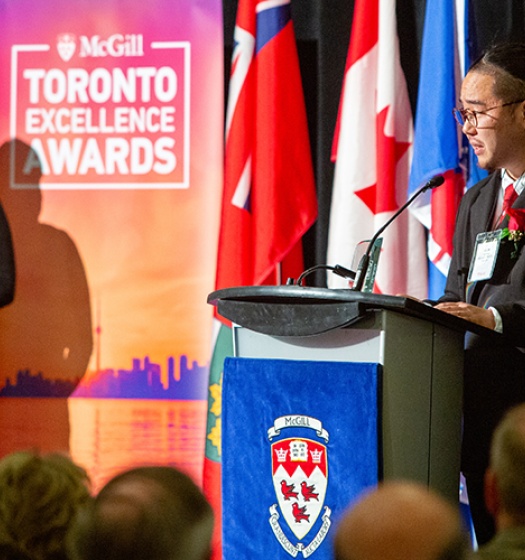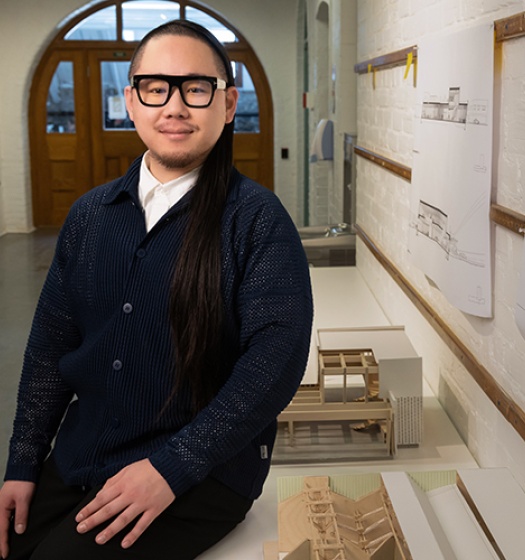Every day, McGillians give rise to change, whether through their work, volunteer outreach, or generosity. McGill24 – the University’s day of giving – celebrates these individuals for the ways in which they are building a better world. For McGill24 Ambassador Kelvin Kung, that means giving rise to connection – of disciplines, communities, and spaces – to make way for openness and equity.
How do love and empathy fit into design and machine learning? Pretty seamlessly, it turns out. Leading with these values is how Kelvin Kung, BSc(Arch)’12, MArch’13, MArch’14, approaches his career in architecture and his advocacy for the LGBTQ+ community, and it’s how he is conceptualizing open and welcoming spaces that foster connection for the greater community.
Born in Vancouver to two immigrant parents, Kelvin had a sense early on that he didn’t quite belong. Jobs were hard to come by, prompting his father to seek work abroad. Kelvin found himself as one of a handful of kids at school being raised by a single mother, and already a BIPOC individual, when he realized he identified as LGBTQ+, he felt yet another level of outsider status. Arriving at McGill as a first-generation university student, Kelvin quickly realized he had a big learning curve ahead of him.
“Architecture is, in some ways, a luxurious education. Our first year, in a course on materiality, we had a conversation about the definition of noble materials. I didn’t really understand what these were, but my classmates knew noble materials to be travertine, marble. My first reaction was, nobility comes from the human spirit and should be something about empathy. And, at the time, I just didn’t know how to articulate that thought.”
It was during his second year at McGill that Kelvin saw his opportunities – and his perspective – expand. Traveling with McGill professors to Rome and Japan helped inform his vocabulary around architecture but also gave him a glimpse of how spaces could be human-centred using even simple materials – something that resonated deeply with him. This would instill in Kelvin an interest in architecture at the intersection of other disciplines, including history and theory. He discussed Aristotle’s De Anima with Emeritus Professor Alberto Pérez-Gómez and studied French architecture and atmosphere with Professor Martin Bressani.
“Kelvin is the type of student one never forgets,” says Bressani. “He was timid at first, yet already glowing with a desire to learn, to absorb everything, and to experiment. He loved art, technology, and theory, and never saw any contradictions between these domains. It is probably what I remember most clearly about him: his desire to cross boundaries, to overcome difference, and to synthesize.”
These discussions led Kelvin to pursue a Master of Architecture with a concentration in Architectural History and Theory at McGill, where he approached design through the lens of philosophers such as Rousseau.
“I learned that to understand people is to understand the human condition, and the best designs reflect empathy. I realized this was the only way I understand how to design, and it motivated and empowered me to share this perspective with others.”
Designing spaces from a place of love has been at the heart of Kelvin’s professional work. A recent iteration of this was at MJMA Architecture & Design, where Kelvin worked on several community centres, including the Western North York Community and Child Care Centre in Toronto. The project was one of only five selected in Canada to win a 2021 Canadian Architect Award of Excellence, praised for its ability to connect two suburban neighborhoods otherwise divided by a defunct printing plant. That experience led to Kelvin working on similar community-focused initiatives, including the Toronto Harbourfront and the East Gwillimbury Community Centre.
When envisioning a new project, Kelvin starts from a place of curiosity. Who will use the space, and what do those people need from it? Eliciting honest feedback from the community is critical.
“Our typical community engagement only gets 300 or so people. Not everyone has time to physically come and give comments.”
That’s where artificial intelligence comes in. Kelvin’s study of Renaissance thinkers helped him see language as encapsulating the human experience. Machine learning and natural language processing – teaching computers to understand and synthesize human text and spoken language – seemed a logical next step for quantifying a large volume of community feedback about its needs.
“With machine learning, we can share a survey with thousands of people and make sense of both short-form and long-form answers. I would read survey responses that were long paragraphs and think, this is really helpful information, but how do I quantify this?” By creating an algorithm set to detect and analyze actionable insights within the responses, Kelvin can compile massive amounts of survey data to draw important conclusions. “In a survey of 4,000 people, you can learn that 1,500 of them need a gender-neutral changing room for their kids, or that other individuals hate dark spaces. One person on an engagement team can’t sift through 4,000 survey responses and have the time to understand all these needs.”
Kelvin received personal recognition for his cross-disciplinary applications of architectural design, artificial intelligence and community leadership from his alma mater, which bestowed on him the Rising Star Award at the 2022 McGill Toronto Excellence Awards.

Kelvin’s deep dive into machine learning has led him to share his knowledge – and acquire more – in the tech sector. In November 2022, he presented his AI learnings and their applications to LGBTQ+ communities at QT Qonference, the inaugural Canadian event of QueerTech, a Montreal-based group which connects thousands of LGBTQ+ professionals with the tech industry across Canada. The only architect in the room at the conference, which was hosted by Chris Barry, the president of Microsoft Canada at its head office in Toronto, Kelvin showed techies and engineers how using natural language processing in tandem with video analysis could help us understand people’s body language in certain spaces – the areas they use the most, as well as those they tend to avoid. Analyzing these behaviours allows for an optimization of design so that spaces can be built to serve people’s needs.
Since August 2022, Kelvin has worked in the Toronto office of Gensler, one of the largest architectural firms in the world. Gensler is equipped with global resources and opportunities to further Kelvin’s application of artificial intelligence in architecture. Kelvin is also trying to create a more expansive network for LGBTQ+ professionals in his field, and he has found an ally in this firm.
At Gensler, Kelvin has found individuals who share his appetite for equity in the design industry. “I'm actively engaging all my coworkers. We have events and talk about gender identity. Several people have come to me to tell me privately how excited they were for these events. This makes me feel like we're doing a good work.” Gensler even hosts an annual Gensler Pride event, for which Kelvin was chosen by his colleagues to be co-chair.
Gensler has supported Kelvin as he engages the next generation of design leaders. As a mentor, he reviews portfolios of budding BIPOC designers – graphic, interior, or architects – and invites them to his office for a casual career talk and to share advice. In tandem with the 519, a hub of LGBTQ+ activity and support in Toronto, plans are underway for Kelvin to host a tour of Gensler for LGBTQ+ youth. As Kelvin notes, “Once you see it in real life, you can believe it’s possible, and you can aspire to it.” As a Board Director with ArQuives, the largest independent archives for LGBTQ+ history in the world, Kelvin is building the first LGBTQ+ virtual gallery, expanding access to important archive materials for all who are interested.
As for what’s next, Kelvin hopes to bring his architectural skills, interest in machine learning, and empathy to the healthcare setting. Inspired by his personal experience caring for his father during a decade-long battle with cancer, Kelvin sees the potential for design and AI to address the needs of both patients and practitioners, and to raise more awareness of gaps in palliative care and care for an aging population. With Gensler’s backing, he has submitted a design to SHIFT OAA, a health-centered competition run by the Ontario Association of Architects, for a palliative care patient room featuring modular pieces that can respond to feedback in real time. His next step is to create machine-learning based surveys that capture the needs of healthcare professionals in clinical spaces. “Once we have the data for that, then we can change the way we design for health.”

March 15 is McGill24, the University’s annual day of giving, when the global McGill community will come together to support students, researchers, and student-athletes. Visit mcgill24.ca to learn more about how the generosity of donors on that day goes further to empower hard-working McGillians to give rise to change.

